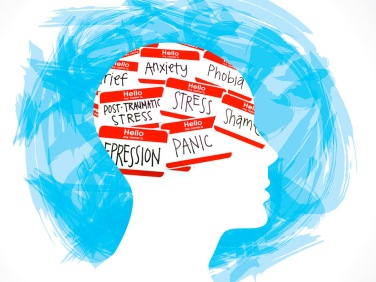Guest Post by Jennifer Richards
The dismissive idea of the ‘snowflake generation’ suggests that vulnerability and being considerate is a weakness, but young people are the ones paving the way through their honesty, activism and brilliance. Whether it’s Amika Georgia, who created the #FreePeriod campaign, the students from Never Again who organised the March for Our Lives, or all the young people I see starting feminist, queer and mental health societies at their school, I’m inspired by young people on a daily basis.
The experience of young people
But sadly young people today are often put under an intense amount of pressure and have little mental health support. We are in a fast changing world and it’s right that there is a lot of emphasis on how social media can negatively impact mental health, but there are also adverse childhood experiences that can contribute to mental health issues. This includes a poverty rate that is increasing because of austerity, homo/bi/transphobia meaning that LGBT youth are at a higher risk for suicide attempts, and last year a report by the Education Policy Institute found that black and minority ethnic children are less likely than their white counterparts to access traditional mental health services.
With Wish being a woman’s mental health charity, we also understand how sexism can affect young girls’ mental health. The 2018 Good Child Report by The Children’s Society found that social media and the internet had more of a negative effect on girls than boys, and that relationships with family and comments relating to appearance had more of an impact on girls’ happiness.

Cuts and resources
Funding cuts to health and social care also means young people are left on waiting lists, which only exacerbates their mental health issues. Three-quarters of parents said that their children’s mental health deteriorated while waiting for support from Child and Adolescent Mental Health Service (CAMHS). And there is also an issue of how far young people have to travel to receive mental health care. Bed shortages have meant that children and young people with serious mental health problems are receiving treatment as far as 285 miles away from their homes.
With this lack of funding and resources, young people are put in the awful position where they have to ‘prove’ how bad their mental health is just to ensure they get treatment. I remember when I was 19 ringing up a counselling organisation (the number given to me by my GP) after having almost walked out in front of a car, only having been stopped by my mum. The person on the other end of the phone told me that there would be a long wait for therapy because I hadn’t actually attempted to kill myself. The insinuation being I just hadn’t tried hard enough. When I explained how close to trying I had been, the person I spoke to called me by the wrong name and hung up on me. Two years later and I still find myself replaying that phone call in my head, still not quite sure how to process it.
Though I hoped things would improve following the government’s pledge in2015 for an extra £1.4 billion to transform CAMHS, a FOI request from Young Minds showed that nearly two third of CCGs had used some or all of that extra money to backfill cuts or to spend on other priorities.

So what can we do to improve the situation?
- There needs to be a greater accountability for how the CAMHS budgets are spent. The FOI request from Young Minds had fewer than half of the CCGs who responded being able to provide full information about their budget. We need to know where this money is going to ensure it is being spent in a way that best supports young people.
- We need to open up the dialogue between young people and policy makers. To improve mental health care for young people, it seems obvious that the people who need to be at a forefront of this conversation is those young people. Just because those under 18 can’t vote doesn’t mean their views should be seen as less important to MPs. If you’re a policy maker who finds yourself on a committee where you’re discussing young people’s mental health – but don’t see anyone who will be directly affected by this policy at the table – will your answers really be reflective of what they need?
- We need to look at the intersections of mental health and have this reflected in policy. There are life experiences that make a young person more predisposed to having mental health issues, and it’s dangerous to ignore this. Being LGBT, a person of colour or a girl all adversely effects a young person’s mental health, and we need to see this reflected in the mental health support young people are given. Our Women’s Mental Health Network is all about looking at these intersections, and we would love you to join our Network and contribute your voice to this vital conversation.
Join in the conversation with us @wishcharity using #WorldMentalHealthDay!
Mental health charities where young people can receive support from include:
Charlie Waller Memorial Trust


WHY IS THERE NO HELP FOR OVER 25s WITH MENTAL HEALTH PROBLEMS. I SUFFER WITH PERSONALITY DISORDER AND CLINICAL DEPRESSION WHERE CAN I GO TO FOR HELP.
THANKS
CARTIER JOANNA HATCHETT
LikeLike
We know that accessing mental health services can be really difficult for people of any age, and the current situation is dire. All of the awareness campaigns tell people to ask for help, but when they do there’s nothing available or there’s a long waiting list. All we can suggest is trying to find other ways to keep going whilst you wait for some support, whether that’s from the NHS or a charity – and if it’s the case that your GP won’t refer you for extra support, try again with a different GP and see if you can take someone with you to help you make your case. Peer support groups, whether online or in real life can be really helpful, there’s telephone and email helplines like the Samaritans, and getting involved in campaigning can sometimes help you feel like you’re taking some positive action. You’d also be very welcome to email us on womensmhnetwork@gmail.com, and if you tell us which part of the country you’re in, we might be able to link you up with someone who can offer you some support. We wish you all the best and hope you find the help you need very soon.
LikeLike